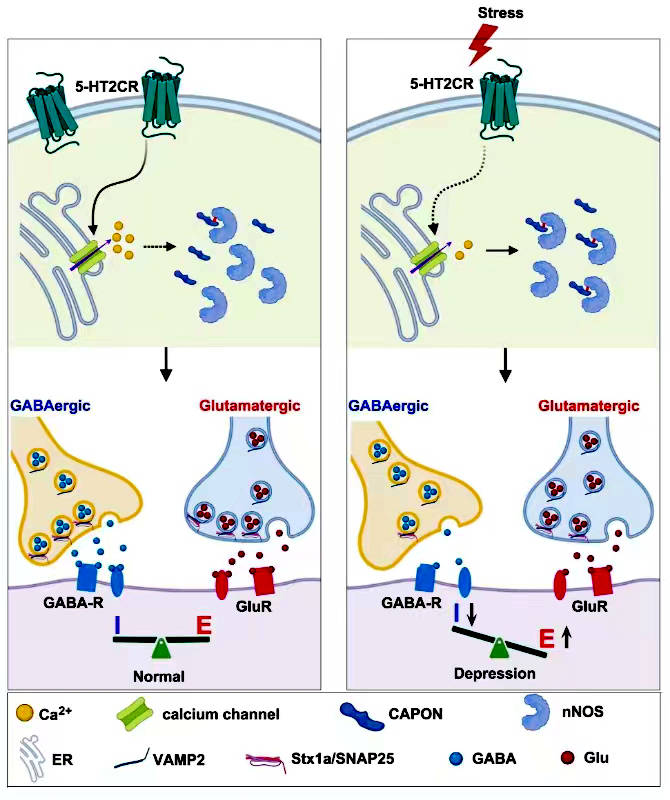【Southeast University】
Recently, Professor Zhu Lijuan’s team from the Medical School of Southeast University and the Key Laboratory of Genes Related to Development and Diseases of the Ministry of Education collaborated with Professor Wang Zhen’s team from the Shanghai Jiao Tong University School of Medicine-affiliated Mental Health Center to publish a research paper titled “Hippocampal excitation-inhibition balance underlies the 5-HT2C receptor in modulating depressive behaviors” in the internationally renowned academic journal “Brain,” reporting on the molecular and cellular mechanisms of 5-HT2C receptor regulation in depression.
Depression is a common mental disorder with increasing incidence year by year, bringing heavy burdens to society and families. However, there is currently a lack of rapid-acting and safe therapeutic drugs in clinical practice, and the understanding of the pathological and physiological mechanisms of depression is still not deep enough. Since the proposal of the serotonin (5-HT) hypothesis, abnormal serotonin signaling has long been considered a key factor in the pathogenesis of depression. Clinical studies have shown that the signal transduction disruption caused by pre-mRNA editing of the 5-HT2C receptor (5-HT2CR) is closely related to depression, but its underlying mechanism is not yet clear.
The research team first used pharmacological tools to study and found that 5-HT2CR regulates the interaction between neuronal nitric oxide synthase (nNOS) and the carboxyl-terminal ligand of its PDZ domain (CAPON) through intracellular Ca2+ signaling, affecting the inhibitory neurotransmitter GABA release in synaptic vesicles and the excitation-inhibition (E/I) balance of neurons, thereby regulating depression. They proposed that the E/I imbalance triggered by the nNOS-CAPON coupling is a key cellular event for depression caused by the loss of 5-HT2CR signaling related to chronic stress. In addition, the research team designed and synthesized the specific inhibitor ZLc-002 to block the nNOS-CAPON coupling, reversing the soluble N-ethylmaleimide-sensitive factor attachment protein receptor (SNARE) assembly-mediated synaptic vesicle release impairment caused by the loss of 5-HT2CR signaling and the resulting neuronal E/I imbalance, effectively alleviating depressive symptoms. This study deepens the understanding of the pathogenesis of depression, provides intervention targets for drug development, and further highlights the potential application value of nNOS-CAPON decoupling agents in major neurological and psychiatric diseases such as depression.
Shi Hujiang, Xue Yiren, Shao Hua, and Wei Cheng are co-first authors of this paper, and Professors Zhu Lijuan and Wang Zhen are co-corresponding authors. Professor Ren Siqiang’s team from Southern Medical University provided great support and assistance for this research.
This research was supported by the National Natural Science Foundation of China, the Jiangsu Province Outstanding Youth Fund, the Shanghai Education Commission, and the Southeast University Outstanding Youth Scholar Support Plan, among other projects.
Article Link:
https://academic.oup.com/brain/advance-article/doi/10.1093/brain/awae143/7664361
Disclaimer: The information and images in this document are from government/park management committee official websites, official public accounts, material-related media, and other public materials. If there are any inaccuracies or omissions, please contact us for modification; we respect intellectual property rights, and for the compilation of materials, this document quotes some public third-party data, images, and other content owned by the original authors, and all cited content is marked with the original source and author in the text. If the copyright owner believes that this document infringes or has other issues, please contact us for timely handling; we strive for rigorous and accurate data, but due to time and staff constraints, there may inevitably be some omissions. If there are major mistakes or inaccuracies, please do not hesitate to provide criticism and corrections. Source: Dongda News Network


